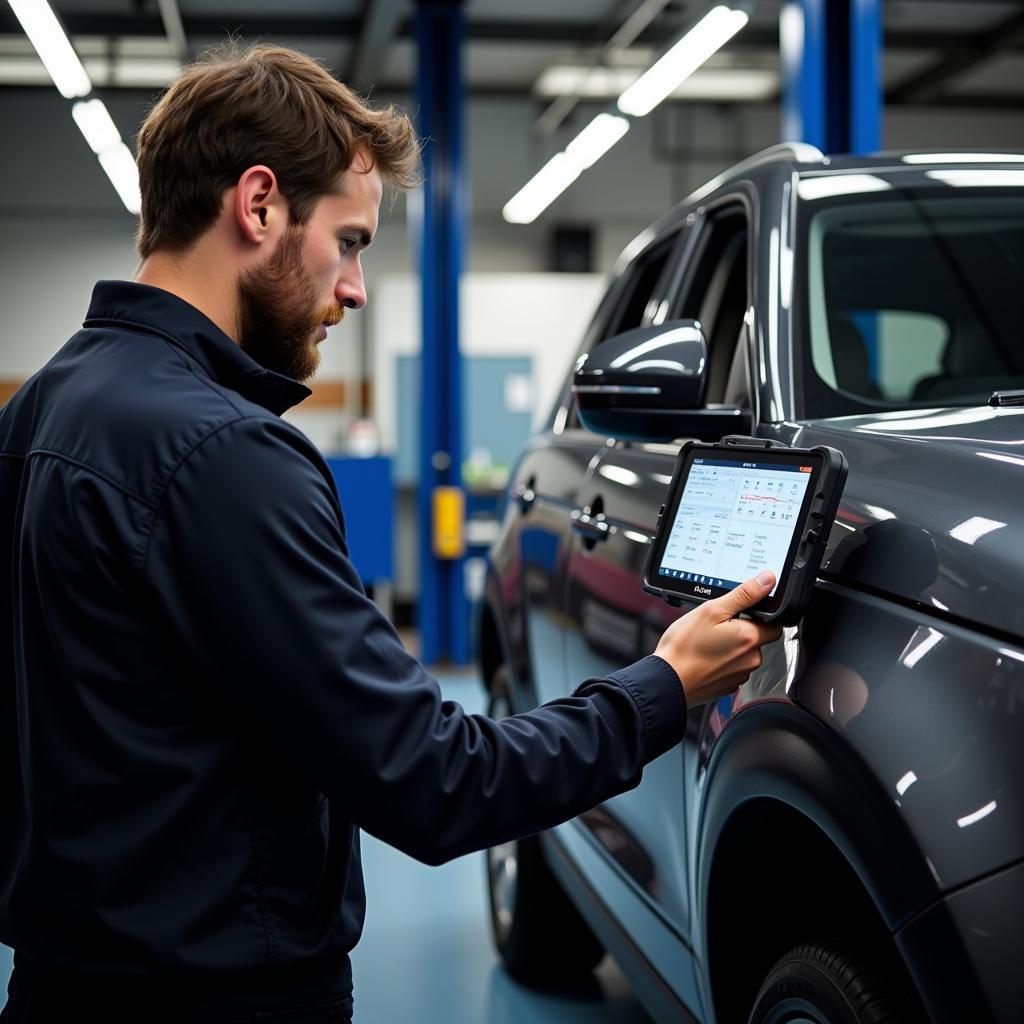Car diagnostics is essentially a health checkup for your vehicle. It involves using specialized electronic equipment to communicate with your car’s computer system, retrieving valuable data about its performance and identifying potential issues. This data is crucial for understanding the overall health of your car and addressing any underlying problems.
Diving Deeper into Car Diagnostics
Think of your car’s computer system as its brain. It continuously monitors and controls various functions, from engine performance to airbag deployment. This system stores a wealth of information about your car’s history, performance, and any malfunctions it encounters.
This is where car diagnostics come in. By connecting a diagnostic tool to your vehicle’s OBD-II port (usually located under the dashboard), mechanics and technicians can access this treasure trove of data.
This information is presented in the form of Diagnostic Trouble Codes (DTCs), which are essentially codes that correspond to specific issues. These codes act as a starting point for troubleshooting, giving mechanics a clearer picture of what might be wrong with your car.
Why is Car Diagnostics Important?
In the past, diagnosing car problems was a bit like detective work, relying on a mechanic’s experience and intuition. Car diagnostics has revolutionized this process, making it far more accurate and efficient.
Here’s why regular car diagnostics are crucial:
- Early Detection and Prevention: Diagnostic scans can detect issues in their early stages, even before they manifest as noticeable symptoms. This allows for timely repairs and prevents minor issues from escalating into major (and costly) problems down the line.
- Accurate Diagnosis: DTCs provide specific clues about the nature of the problem, reducing guesswork and ensuring accurate repairs. This saves you time and money by avoiding unnecessary repairs.
- Improved Safety: By identifying potential safety hazards like faulty brakes or airbag systems, car diagnostics plays a vital role in ensuring your safety on the road.
- Enhanced Performance and Fuel Efficiency: Identifying and addressing issues that affect engine performance or emissions can lead to a smoother running engine, better fuel economy, and reduced emissions.
- Increased Resale Value: Regular car diagnostics, along with a well-documented service history, can increase the resale value of your vehicle by demonstrating that it has been well-maintained.
 Mechanic Using Diagnostic Tool on a Car
Mechanic Using Diagnostic Tool on a Car
What Does Car Diagnostics Tell You?
Car diagnostics can provide a wealth of information about your car’s health, covering various systems and components. Some common areas covered by car diagnostics include:
- Engine Management System: This includes aspects like fuel injection, air intake, ignition timing, and emissions control.
- Transmission System: This covers the transmission’s performance, shifting patterns, and potential issues with the gearbox.
- Brake System: Diagnostics can check the functionality of the ABS system, brake fluid pressure, and other components related to braking.
- Airbag System: This is crucial for safety and diagnostics can ensure the airbag control unit and sensors are functioning correctly.
- Other Systems: Car diagnostics can also provide information about the battery, charging system, steering, suspension, and various other electronic modules within the vehicle.
Can I Do Car Diagnostics Myself?
While professional-grade diagnostic tools were once exclusive to mechanics, there are now more affordable, user-friendly options available for car owners.
These DIY diagnostic tools, often paired with smartphone apps, allow you to:
- Read and clear basic DTCs: This can be helpful for understanding simple issues or resetting the check engine light after minor repairs.
- Monitor live data: Some tools provide real-time information about engine parameters, fuel economy, and other performance indicators.
However, keep in mind that interpreting DTCs and understanding complex vehicle systems still requires mechanical knowledge. While DIY tools can be helpful for basic tasks, it’s generally recommended to consult a qualified mechanic for comprehensive diagnostics and repairs.
Conclusion
Car diagnostics has transformed the way we maintain and repair vehicles. By providing a window into the inner workings of our cars, it allows for accurate diagnoses, proactive maintenance, and ultimately, a safer and more reliable driving experience. Whether you opt for professional diagnostics or explore DIY options, remember that understanding your car’s health is key to its longevity and your peace of mind.
FAQs About Car Diagnostics
Q: How much does it cost to run diagnostics on a car?
A: The cost of car diagnostics can vary depending on factors like your location, the mechanic’s hourly rate, and the complexity of the issue. how much is it to run diagnostics on a car
Q: How often should I get car diagnostics done?
A: It’s generally recommended to have your car’s diagnostics checked at least once a year, ideally during regular maintenance like an oil change.
Q: Can car diagnostics fix problems?
A: Car diagnostics itself doesn’t fix problems. It’s a tool for identifying issues. Once a problem is diagnosed, appropriate repairs can then be carried out.
Q: What is the difference between OBD-I and OBD-II?
A: OBD-II (On-Board Diagnostics II) is a standardized system used in most cars manufactured after 1996. It provides more comprehensive data and is compatible with a wider range of diagnostic tools compared to the older OBD-I system.
Q: Can a bad battery affect car diagnostics?
A: While a very low battery might disrupt the diagnostic process, a slightly weak battery usually won’t affect the accuracy of the results. However, it’s always a good practice to ensure your battery is in good condition before any diagnostic scan.
For more information about car diagnostics and to discover the best diagnostic tools on the market, explore DiagFixPro’s website.
Need further assistance?
Contact our team of car diagnostic experts 24/7 via WhatsApp: +1(641)206-8880 or Email: [email protected]. We are here to help you!

Leave a Reply